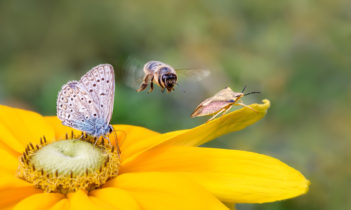
By disengaging from the sustainability imperative — even temporarily — companies are depriving themselves of one of the greatest levers they have to protect their businesses against future risks.
In brief
- The effects of the war in Ukraine are now being felt in global supply chains, especially those that feed into the world’s food system.
- The economic impact of the Ukrainian crisis has left food and beverage companies with the challenge of how to minimize revenue loss in order to stay profitable, and maintain operations. With this comes concern that companies could neglect their sustainability agendas, canceling long-term strategies and initiatives as they look for ways to navigate disruption and short-term risks.
- Investing in sustainability strategies and activating them now can help businesses and their supply chains to build resilience and prepare for future shocks brought on by the environmental crisis . Now is the time for businesses to redouble their efforts to build a resilient and secure food system.
A humanitarian catastrophe is in full swing in Ukraine, as the Russian invasion razes cities to the ground, forcing millions to flee the country. The outside world has responded in many ways, including a series of sanctions and trade embargoes, the effects of which are now starting to be felt in global supply chains, especially those that feed into the world’s food system.
How the food and beverage sector responds to this growing crisis in the global food system is crucial. Many of the crises we face today are proxies for, or closely linked to, the environmental emergency we face. They’re live drills for the challenges that lie ahead. Companies are having to make quick decisions and move into emergency management mode. For many businesses, sustainability is not part of business continuity planning, meaning budget and resources that would be spent on addressing critical environmental issues may be redirected or decisions made that undermine, or even reverse, sustainability efforts. A knee jerk reaction now, with long-term environmental goals ditched for short-term gains, could mean that disruption to food production, and the hardship it brings, becomes the norm. Now is the time for businesses to double down on their efforts to build a resilient and secure food system.
It’s ‘now or never’ but short-term thinking continues to trump long-term goals
The economic impact of the Ukrainian crisis has left food and beverage companies with the challenge of how to minimize revenue loss in order to stay profitable, and maintain operations. The sector is facing drastic price jumps due to the shortage of key commodities, with the risk that FMCG producers could look for ways of cutting costs, such as cancelling long-term strategies and initiatives that don’t have an immediate impact on business outcomes.
It’s a way of thinking that has put science-based targets and environmental strategies under threat, yet these long-term goals and objectives are crucial for securing the future of our food system and the businesses, suppliers, farmers and ecosystem services that underpin it. As the latest IPCC report published earlier this year spelled out, all sectors need to transform rapidly — it’s ‘now or never’ to prevent the worst of climate change. With food systems responsible for more than a third of all man-made greenhouse gas emissions and agriculture accounting for 70% of terrestrial biodiversity loss, the food and beverage sector, in particular, has a critical role to play. By disengaging from the sustainability imperative — even temporarily — companies are depriving themselves of one of the greatest levers they have to protect their businesses against future risks.
A perfect storm
The impacts of the war in Ukraine are not only being felt regionally, but across the world because of the region’s significant contribution to the global food system.
Russia and Ukraine are major agricultural producers, together accounting for around half of the world’s sunflower oil, 30% of its wheat and barley, and 17% of its maize. Sanctions have curtailed many of the exports coming out of Russia, while in Ukraine fields have become battlegrounds. Crops lie unharvested and next year’s seeds unplanted, while those that have been produced struggle to leave the country.
Wheat and maize are two of the three mega crops (rice, wheat and maize) that supply more than half of the world’s food energy, which makes the production and export challenges created by the war particularly problematic. Reduced availability and price hikes will have widespread effects that could be far-reaching, but poorer and vulnerable populations will bear the brunt of the consequences.
Areas such as the Middle East and Africa that will feel the grain shortage the most, with over 100 million people reliant on huge volumes of imports. UN secretary-general Antonio Guterres has warned of the need to avert “a hurricane of hunger and a meltdown of the global food system.”
Food producers are also feeling the impacts of the war. Many are unable to access the fertilizer and agricultural inputs they need. Russia exports large quantities of fertilizer and soil nutrients too, but as production stalls, prices are rising. This has brought further knock-on effects around the world, with other crops such as soy, corn and rice, which also rely on regular inputs of synthetic nutrients, starting to struggle.
The conflict is having further impacts too, not least through soaring energy bills, which affect households and everyone in the food industry, from farmers to hauliers, processors to retailers. However, the situation could worsen if countries react by closing markets, setting off a domino effect of trade restrictions and export bans, similar to those seen in 2007-08 and again in 2010-12, with potentially catastrophic outcomes.
Continuity, but at what cost?
With one-fourth of the wheat consumed in Europe coming from Ukraine, the European Commission has had to move quickly to maintain the EU’s food security. Alongside financial support it has outlined plans to suspend sustainability obligations on farmers, which are central to its Farm2Fork policy.
For example, cereal farmers currently leave 4% of their land fallow. According to the European Commission, using this land could release four million additional hectares for extra crop production, yet fallows — cultivated land that is not seeded for one of more growing seasons — are also considered important for biodiversity, providing a variety of organisms with sources of food such as weeds, seeds, and invertebrates, as well as vegetation cover for foraging and nesting. Agriculture is already seen as one of the major causes of the current sixth mass extinction and is said to be responsible for 70% of terrestrial biodiversity loss, due to factors such as the use of pesticides, deforestation and the creation of monocultures, where little else can survive.
Expanding production of other plant-based oils, to fill the gap left by a lack of Ukraine sunflower oil, is also set to put additional pressure on land.
Palm oil, for instance, is responsible for high levels of peatland drainage, as well as deforestation. Soybean expansion in Brazil has also seen huge swathes of the Amazon felled, while the expansion of rapeseed in Europe and North America has native grasslands plowed up, as well as pushing out other commodities to less favorable farming areas.
The assumption is that these types of measures will be temporary, but there are fears that rather than simply delaying the transformation towards more sustainable food production, they could completely derail it, with dire long-term effects. Ditching rules to ban certain pesticides, for instance, could cause irreparable damage and put pollinators such as bees under additional pressure.
Food security starts with sustainability
There are options and possible solutions to the food crisis that food businesses can leverage to protect sustainability gains and accelerate the industry’s role in tackling the environmental crisis.
In a statement from the Potsdam Institute for Climate Impact Research signed by more than 600 international experts, three key measures have been put forward that could help the food sector cope with short-term shocks such as the Ukrainian crisis, while also protecting human health and long-term sustainable development:
- Support the shift towards plant-based diets, particularly in high-income countries. It is estimated that one-third of global calories are used to feed animals. An 8% reduction in the use of cereals for animal feed in the EU could outweigh the expected loss of Ukrainian grain.
- Allied to this, there are huge opportunities to rein in biofuels as well. For instance, roughly 40% of American corn is used for ethanol production, although its climate benefits are increasingly disputed. Both measures could see existing agricultural land turned over to human food production.
- Reduce the dependency on energy-intensive nitrogen fertilizers — and the Russian natural gas needed to make them — by increasing the production of legumes that naturally fix nitrogen in the soil. The EU’s Farm2Fork strategy sets out plans to expand organic agriculture by 25% and reduce fertilizer use by a third by 2030. This would bring positive knock-on effects too. The overuse of synthetic fertilizers is blamed for soil degradation and water pollution, and by cutting back farmers can help improve soil quality, strengthen biodiversity in agricultural landscapes and boost food security by preserving ecosystem services.
Chemical inputs are also costly and their lack of availability could save farmers money, breaking their reliance and hastening their adoption of more long-term regenerative farming practices.
Reduce food loss and waste across the value chain. The amount of wheat wasted in the EU alone is roughly equivalent to half the amount of Ukraine’s waste exports and, according to the UN, roughly one-third of the food produced in the world for human consumption every year — approximately 1.3 billion tonnes — is never eaten, squandering resources including land, water, energy, capital and labor, while needlessly generating greenhouse gas emission and aggravating ecosystem damage.
“The way we farm now, it’s not resilient to climate shock and even economic shock,” Celia Nyssen, policy officer for agriculture at the European Environmental Bureau, recently commented.
Prioritizing greater food production above all else will only further damage the environment, increase our fossil fuel dependency and threaten long-term food security.
Investing in sustainability strategies and activating them now, however, can help businesses and their supply chain to build resilience. Sustainability needs to be built into business continuity planning as a way of preparing companies for future shocks brought on by the climate crisis and events, such as the war in Ukraine. So rather than abandon the transformation towards a healthier, more sustainable food system, we need to redouble our efforts, otherwise the effects of the Ukraine crisis on society, food system and the global economy will become a test drive for the new normal. And then the opportunity to address the climate crisis and tackle biodiversity loss will have gone forever.
Related resources

When it comes to biodiversity, businesses are at a loss
Most sustainability professionals aren’t clear about what biodiversity loss means for business and how to tackle it. Here’s what you need to know.

Reductions or removals? Why science — not market forces — must shape our pathway to net zero
To reach net zero by 2050, we need a common, science-based understanding of what the goal means for business.

